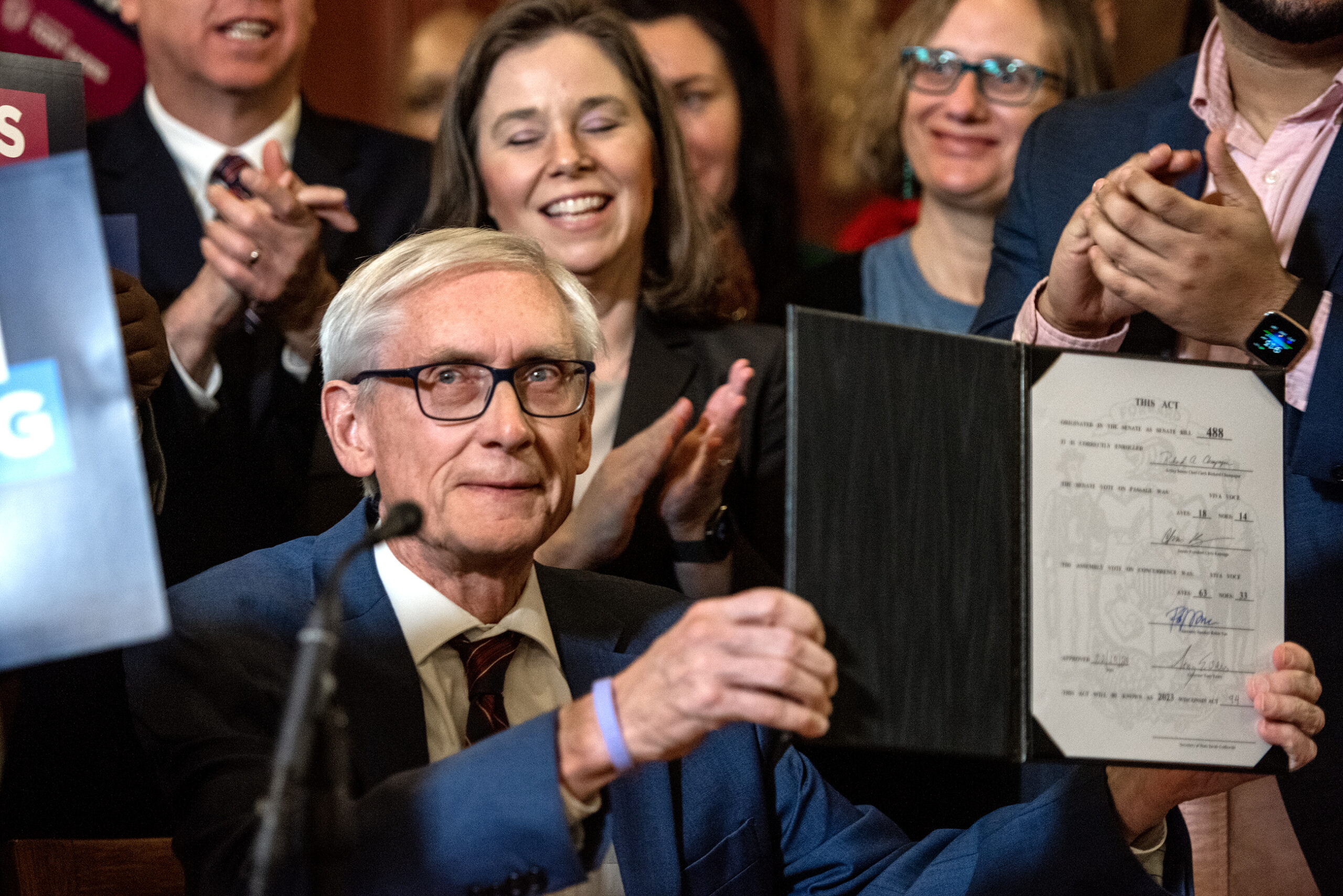The state Senate voted Tuesday to fire Gov. Tony Evers’ pick to lead the state Department of Agriculture, Trade and Consumer Protection — an unusual move that comes during continued conflict between the Republican-controlled Legislature and Democratic administration.
Senate lawmakers voted 19-14 against agriculture Secretary Brad Pfaff’s confirmation, with all Republicans voting against and all Democrats voting in favor. According to the Legislature’s nonpartisan research office, the state Senate hasn’t fired a member of a governor’s Cabinet since at least 1987.
The vote means the top job in the state agriculture department will be vacant until Evers brings forward another nominee.
News with a little more humanity
WPR’s “Wisconsin Today” newsletter keeps you connected to the state you love without feeling overwhelmed. No paywall. No agenda. No corporate filter.
Speaking with reporters after the vote, the governor said he doesn’t know how he’ll move forward with the vacancy.
“I can’t even speak about that now, I’m so PO’d about the fact of what happened today,” Evers said. “This was a vote against the farmers of Wisconsin. Period.”
Evers criticized Republican lawmakers for sending a message that administration officials can’t publicly challenge the Legislature. Pfaff had openly sparred with Republicans over delayed state funding for a farmer suicide prevention program. Republicans accused the secretary of politicizing the issue.
“(Pfaff) gets to go home tonight and say to his kids, ‘Oh, by the way, for speaking my mind I have now lost my job.’ That’s what the state of Wisconsin Legislature, the Senate, has just told those kids at home,” Evers said. “Get me a break.”
Senate Majority Leader Scott Fitzgerald, R-Juneau, called on Evers last week to withdraw Pfaff’s nomination, saying there weren’t enough votes in the GOP-controlled Senate to confirm his nomination.
During debate Tuesday, Fitzgerald said Republican senators have concerns with how the secretary has done his job.
“As we stand here today there’s a number of members that just aren’t comfortable with Brad Pfaff,” Fitzgerald said.
GOP lawmakers have also raised concerns with a proposed update, under Pfaff’s supervision, to state regulation of large livestock farms. Pfaff announced Friday the agency would not be moving forward with the rule change. Evers said that was an attempt to appease GOP lawmakers.
Democratic senators pushed back hard against Pfaff’s firing Tuesday, saying Republicans were ignoring the will of the farming community in Wisconsin. Several groups, including the Dairy Business Association, came out in support of Pfaff on Monday.
“It’s going to say to the family farms that you don’t give a damn, because they all support him,” said Sen. Jon Erpenbach, D-West Point.
Senate Minority Leader Jennifer Shilling, D-La Crosse, told GOP senators their action “chips away at the civility of this body.”
“Agriculture is in Brad’s DNA — it is who he is,” Shilling said during debate. “Agriculture shaped Brad’s life, it shaped Brad’s values … it taught him the core beliefs of growing up in a rural community, growing up on a family farm.”
Pfaff has said his upbringing in a family of farmers in La Crosse County informed his work as agriculture secretary.
Before his nomination, Pfaff served as the deputy chief of staff to Wisconsin U.S. Rep. Ron Kind, a Democrat. Previously, he worked as executive director of the U.S. Department of Agriculture Farm Service Agency under the Obama administration.
Only seven of the governor’s 16 cabinet members have been confirmed since he took office in January. Those are state Department of Administration Secretary Joel Brennan, Corrections Secretary Kevin Carr, Revenue Secretary Peter Barca, Veterans Affairs Secretary Mary Kolar, and state Department of Financial Institutions Secretary Kathy Blumenfeld.
Commissioner of Insurance Mark Afable and Public Service Commission Chairperson Rebecca Cameron Valcq were unanimously confirmed Tuesday by the Senate.
The remaining eight unconfirmed cabinet members can still continue in their jobs without confirmation unless the Senate votes to fire them.
Fitzgerald has said some may never be voted on, but also alluded to the possibility on Tuesday of additional firings.
“I don’t know if the rest of them are going to make it,” Fitzgerald said.
Evers also weighed in on the ramifications of Tuesday’s vote on his unconfirmed department heads.
“If I was a total cynic, I’d say keep your damn mouth shut. But I’m not. I want them to be forthcoming, I want them to be professional, that’s why we hired them,” Evers said. “They’re the best people for the job. To think that they’ll have to keep their mouth for the next, who knows, four years in order to get approved by this Senate… that is just absolute bulls—.”
Limit On Governor’s Veto Power Moves Forward
The Senate also voted 19-14, along party lines with Republicans voting in favor and Democrats against, to move forward with a proposed constitutional amendment that would limit Wisconsin governors’ veto powers.
The proposal, sponsored by Sen. David Craig, R-Big Bend, and Rep. Mike Kuglitsch, R-New Berlin, would bar the governor from making any vetoes that increase state spending.
Evers used his veto pen to increase K-12 education spending in the budget by about $65 million.
The sponsors argue that was an abuse of power.
During debate, Sen. Kathleen Bernier, R-Chippewa Falls, said the executive branch has too much power in Wisconsin.
“To be able to create new dollars, I don’t believe that is the intent of the constitution,” Bernier said.
Democratic senators argued against the proposed change. Shilling called it a “power grab” by the GOP majority.
“You can’t help yourselves — you lay awake at night to think of ways we can continue to take away power (from the governor),” Shilling said. “This is today’s power grab by the majority to clip the authority and the power of the Democratic governor.”
Sen. Fred Risser, D-Madison, pointed out Republican governors have used their veto authority to increase spending in the past.
“I think we should give the governor that opportunity,” Risser said.
Wisconsin governors have one of the most powerful veto pens in the country, with the power to remove words, numbers and punctuation from spending bills.
However, the Wisconsin governor’s veto power has been limited gradually over the past 30 years through constitutional amendments.
In order for a constitutional amendment to go into effect it must pass two consecutive sessions of the state Legislature and then be approved by a statewide voter referendum.
In 1990, voters approved limiting the governor’s ability to delete letters from words to create new ones, a practice called the “Vanna White veto.”
In 2008, they stripped the governor’s power to delete words to create new sentences, which was called the “Frankenstein veto.”
The resolution has yet to be voted on in the state Assembly.
Drunken Driving, Nurse Attack Bills Also Approved
Lawmakers also voted on bills that would:
Put in place 18-month minimum prison sentences for fifth and sixth drunken driving offenses. The Senate approved the bill Tuesday. It has yet to be voted on in the Assembly.
Impose a mandatory minimum of five years incarceration for committing homicide while driving drunk. The Senate approved the bill Tuesday. It has already passed the Assembly. It now moves to Evers’ desk.
Increase penalties for assaulting nurses. The Senate approved the bill Tuesday. It has yet to be voted on in the Assembly.
Make it a felony to trespass on or damage oil and gas pipelines. The Senate approved the bill Tuesday. It has already passed the Assembly. It now moves to Evers’ desk.
The Senate approved the bill Tuesday. It has yet to be voted on in the Assembly.
Wisconsin Public Radio, © Copyright 2025, Board of Regents of the University of Wisconsin System and Wisconsin Educational Communications Board.







